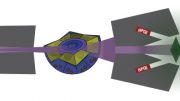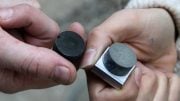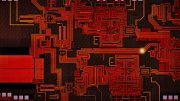A breakthrough study team introduces an efficient and recyclable photocatalytic system for borylation reactions using NHC-BH3, facilitating sustainable, high-value chemical syntheses under mild conditions. Credit: DICP
A team headed by Professor Dai Wen at the Dalian Institute of Chemical Physics, part of the Chinese Academy of Sciences, successfully realized borylation reactions using N-heterocyclic carbene boranes (NHC-BH3). They utilized a straightforward and effective heterogeneous photocatalytic system. This method enabled the synthesis of valuable chemical transformations, such as hydroboration and boron substitution products.
The study was published in the journal Angewandte Chemie International Edition.
Advantages of NHC-BH3 in Free Radical Borylation Reactions
NHC-BH3 are novel boron sources in free radical borylation reactions due to their stable chemical properties and straightforward preparation method. However, the application of NHC-BH3 is hindered by the requirement of a large quantity of harmful free radical initiators, as well as expensive and non-recyclable homogeneous photocatalysts.
In this study, the researchers utilized cadmium sulfide nanosheets, which were easily prepared, as heterogeneous photocatalysts. And they served NHC-BH3 as a boron source, enabling the selective borylation reaction of various alkenes, alkynes, imines, aromatic (hetero) rings, and bioactive molecules under room temperature and light conditions. Since the conversion process fully utilized photogenerated electron-hole pairs, the need for sacrificial agents was eliminated.
Scalability and Recyclability of the New System
Furthermore, they found that the photocatalytic system could not only achieve gram-scale scale-up but also maintain a stable yield after multiple cycles of the catalyst. It could also serve as a recyclable general platform, allowing the recovered catalyst to continue catalyzing different kinds of substrates.
“Our study provides new ideas for the development of free radical borylation reactions using NHC-BH3 as a boron source, and the organoboranes obtained from the reaction may be used to synthesize synthetic building blocks that contain hydroxyl, borate, and difluoroborane reactive sites,” said Prof. Dai.
Reference: “Facile Borylation of Alkenes, Alkynes, Imines, Arenes and Heteroarenes with N-Heterocyclic Carbene-Boranes and a Heterogeneous Semiconductor Photocatalyst” by Fukai Xie, Zhan Mao, Dennis P. Curran, Hongliang Liang and Wen Dai, 9 August 2023, Angewandte Chemie International Edition.
DOI: 10.1002/anie.202306846









Be the first to comment on "Green Chemistry Breakthrough: New Photocatalytic Borylation Method Transforms Chemical Synthesis"